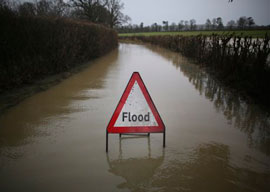
February 25, 2014

Britannia, we proudly and rather wistfully proclaim, rules the waves. Over the last couple of weeks, however, it has seemed that the waves are ruling Britannia. Reading the UK newspaper headlines or watching the news, one might have been forgiven for thinking that the country was becoming a second Atlantis, slipping below the waters to become the legendary inspiration for innumerable bad films and books in a thousand or so years” time. While polar vortices and killer ice storms enveloped the United States, and as Java was covered by volcanic ash, it was, I suppose, typically British that our meteorological downfall should be rain. Large swaths of southern England, and in particular a wide area of low, flat farmland called the Somerset Levels, are only now reappearing after having spent much of February underwater.
Perhaps predictably, but no less depressing for it, the first instinct of our political class was not to drop everything and help. No, they preferred to run around blaming each other. It was the Prince of Wales, not politicians, who first went down to meet those affected by the floods. Only after several days of deeply unedifying squabbling did David Cameron belatedly step in, ordering calm. He may well have hoped to appear like Neptune in The Aeneid stepping in to calm the stormy waves in an uncannily apt passage:
As, when in tumults rise th’ ignoble crowd,
Mad are their motions, and their tongues are loud;
And stones and brands in rattling volleys fly,
And all the rustic arms that fury can supply:If then some grave and pious man appear,
They hush their noise, and lend a list’ning ear;
He soothes with sober words their angry mood,
And quenches their innate desire of blood:So, when the Father of the Flood appears,
And o’er the seas his sov’reign trident rears,
Their fury falls: he skims the liquid plains,
High on his chariot, and, with loosen’d reins,
Majestic moves along, and awful peace maintains.
Unfortunately, he came across rather more like Joyce Grenfell’s harassed and hapless nursery-school teacher desperately pleading: “George, don”t do that!”
General consensus among the most vocal commentators seems to be that the flooding’s overwhelming cause was the decision taken by the Environment Agency, a government organization, to stop dredging the rivers that had been carrying excess water from the region since Dutch engineers first drained them in the seventeenth century. The Agency said that this was all because the government has put a cap on how much they are able to spend on flood defenses in the area. Wider conspiracy theorists noted the instructions from the European Union to let nature revert in natural flood plains. Inevitably there were rumblings from the implacable sides of the climate-change debate.
As it happens, some experts in the field seem to believe that dredging in itself would not have prevented the situation. Partly this was all caused by an extraordinary level of rainfall that fell over a sustained period. It was allegedly the heaviest combination of those two elements since records began some 240 years ago. Deeply distressing though this undoubtedly has been for those affected, and I wish in no way to gloss over their situation, even had everything possible been done to minimize this downpour’s effect, there would still have been a lot of flooding. To go back to Virgil: “sunt lacrimae rerum et mentem mortalia tangent.“ (“There are tears for events and mortal things touch the soul.”)
If this was a one-off, I”d probably leave it at that, wait for the inevitable inquiry, and hope”probably unrealistically”that what can be done will alleviate any such event in the future. But this has been happening a lot lately. In fact, in terms of resultant damage this wasn”t even the worst such crisis to hit the UK recently. Estimates are that about 1,000 properties were flooded. Compare that to the floods in June 2007 when in just Yorkshire and Humberside over 20,000 people were affected. Cynics have noted that hysteria levels in the British media tend to rise exponentially the closer any disaster is to the majority of reporters” southern, and particularly London, homes. They may well have a point.
There is, however, a wider underlying issue that I want to flag, hinted at by the aforementioned EU policy. That is the alarmingly widespread advocacy of returning land to its natural state, or “rewilding” as it is unfortunately often known. This, I suspect, is the underlying, woolly-headed rationale that envisaged a few controlled, decorative flood plains lying around lazily looping tributaries, presumably dotted with cowherds, swains, and milkmaids. Instead, when the heavens opened we were left in our own little bit of Genesis, with desperate Somerset residents beginning to order their pets two by two. The original intent was charming, I agree. Unfortunately it’s only feasible where people haven”t built thousands of houses on land that had always been avoided for its propensity to flooding. So scratch the entirety of lowland Britain.